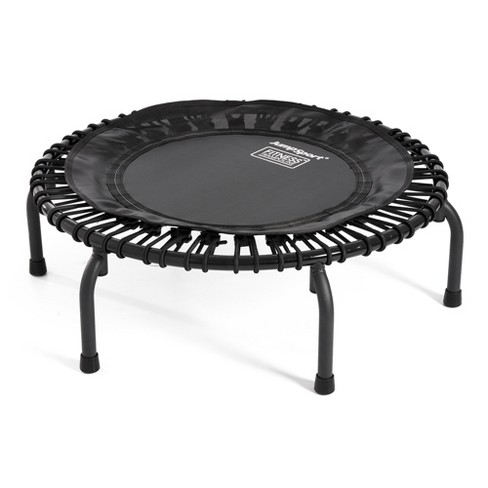Treadmill or Trampoline? Make the Smart Investment
Treadmill or trampoline? The science favors one over the other--find out which one is better for you in this honest and comprehensive comparison!
min read

When most people consider purchasing exercise equipment for their home they think of a treadmill.
But is a treadmill the right investment for you?
Or are there other avenues—like trampolines—that would be more advantageous for getting active?
Hint: The science favors one over the other. And it's not the one you probably think.
As a decades-long springless trampoline innovator and manufacturer, we are well-equipped to cover the “treadmill vs. trampoline” topic in-depth.
We maintain an honesty-first policy, so although we sell trampolines, this will be an objective article using scientific evidence to support any claims made in the debate.
After reading this, you will be all set to decide whether a treadmill or a trampoline is a better fit to meet your fitness goals!
3 Scientific Facts About Treadmills and Trampolines
Here are three scientifically driven facts about jumping on a trampoline vs. running on a treadmill:
-
Force of Impact
Lots of people use running as a way to get fit.
While it is certainly a good way to train your cardiovascular system, running can also cause undue stress on your joints due to the force of impact.
“One downside of running is that it can lead to orthopedic injuries,” says John Porcari, Professor of exercise and sport science at the University of Wisconsin La Crosse, who goes on to note that trampolines absorb more of the shock of the movement, which eases the stress on your lower extremities.
According to Vuly, a trampoline mat absorbs over 80% of the impact on your joints, preventing the jarring of ankles, knees and spine.
The low-impact nature of trampolines serves as a major advantage over running on a treadmill, particularly if you’re dealing with a pre-existing orthopedic injury.

-
Calorie Burning
Running is typically synonymous with burning calories and helping with weight loss.
You may be surprised, then, to find out that trampoline jumping burns more calories than running on a treadmill.
In an oft-cited study, Victor L. Katch at the University of Michigan found that a 150-pound person burns 71 calories jogging at 5 mph for 12 minutes.
For the same 12-minute timeframe, a 150-pound person burned 82 calories while jumping on a trampoline.
Furthermore, a study by the American Council of Exercise found that jumping on a trampoline for 20 minutes burns the same number of calories as running 6 mph for the same duration.
-
Efficiency
Many people struggle to find time to work out and trampolines have proven to do more in less time than running.
A classic study by NASA Scientists found that jumping on a trampoline for 10 minutes is a better cardiovascular workout than running for 33 minutes.
In the same study, NASA Scientists concluded that trampolines were 68% more effective than jogging yet required less effort.

The Pros and Cons of Treadmills
Now that you know what the science says, let’s go over the pros and cons of running on a treadmill.
The type of treadmill you buy will play a role in your experience and satisfaction with the machine.
For example, a cheaper treadmill may not have as many settings or simulation options as expensive treadmills.
Because of this, we will focus on the general pros and cons that all treadmills should share:
Pros of running on a treadmill:
-
The softer surface of a treadmill is easier on your joints than running on concrete or pavement (however, as evidenced by the “Force of Impact” Section above, it’s not as forgiving on your joints as trampoline jumping is.)
-
Good for cardiovascular/heart health.
-
Convenient, accessible and unaffected by the weather if placed indoors.
-
You’re able to control your incline and speed.
An example of a treadmill, courtesy of BowFlex:

Cons of running on a treadmill:
-
Agility may weaken due to consistent running on a flat surface.
-
Used conventionally, treadmill running doesn’t work many muscles.
-
Running inside might be considered boring for some.
-
Costs money and takes up space.
Health.com wrote up a solid article on the pros and cons of running on a treadmill if you’re curious to learn more about the points above in greater detail.
The Pros and Cons of Trampolines
Let’s flip it over and cover some of the main pros and cons of trampoline jumping.
Note that there are two major types of trampolines commonly used for exercising: Rebounders (mini-trampolines) or outdoor trampolines (the type of trampoline you may have had as a child).
We’re going to use overlapping pros and cons that rebounders and outdoor trampolines share to avoid confusion:
Pros of jumping on a trampoline:
-
Good for heart health/cardiovascular system.
-
Easier on your joints.
-
Trains balance/coordination.
-
Helps with weight loss.
-
Can be a boon to your mental health and a fun way to get active.
An example of a rebounder, courtesy of Target:

An example of a backyard trampoline, courtesy of Springfree Trampoline:

Cons of jumping on a trampoline:
-
Sprains and fractures can occur.
-
Spine conditions (like Osteoporosis and Sciatica) may be worsened.
-
Muscular strength development may stagnate.
-
Takes up space and costs money.
If you would like to learn more about the advantages and disadvantages of jumping on a trampoline, we’ve previously written an article that expands on each of the points above in detail.
Check it out: Pros and Cons of Trampoline Exercise | What You Need to Know
Which One Is Right for You, Treadmill or Trampoline?
Scientifically speaking, trampolines are a more efficient way to workout than running on a treadmill in a few key categories.
They are easier on your joints, burn more calories in less time and typically provide a livelier experience than treadmill running.
That doesn’t mean you should always choose a trampoline over a treadmill, though.
Trampolines are a good option to have for a workout, but if you don’t have kids or anybody else to use the trampoline, then you may want to opt for the treadmill since it’s designed specifically for workouts.
Treadmills and trampolines both cost money and take up space.
This point makes it crucial that you do your research ahead of time so you’re not wasting your hard-earned money on something that turns out to be inadequate for you.
Is a Springfree Trampoline Your Exercise Solution?
Our expertise is in backyard trampolines, specifically our Springfree Trampolines—which have proven, by independent research, to be the safest, highest quality and longest-lasting trampolines on the market.
If you’re thinking about buying an outdoor trampoline to use as a dual threat, for exercise and for your kids to burn off that adolescent energy, a Springfree Trampoline might be a solution for you.
However, because of their superior safety and quality, Springfree Trampolines are among the most expensive backyard trampolines you can buy. They range from $799-$3,999.
The high price point of our Trampolines likely means you have some questions that need answers before considering whether to purchase one.
That being the case, we have crafted two honest and straightforward articles to answer your most pressing questions about Springfree Trampolines and help you determine whether one is right for your family.
Read through the articles below and make an educated decision on whether a Springfree Trampoline is right for you:

